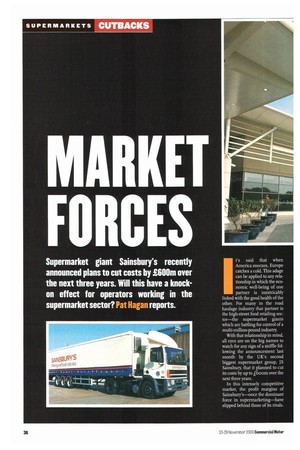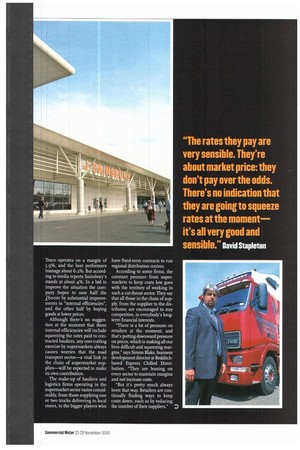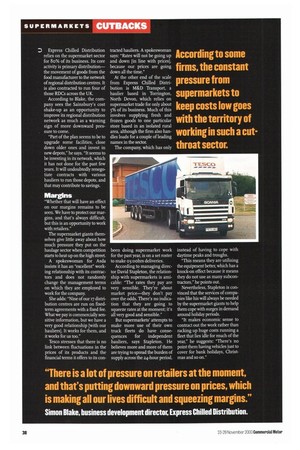MARKET FORCES
Page 38

Page 39

Page 40

If you've noticed an error in this article please click here to report it so we can fix it.
Supermarket giant Sainsbury's recently announced plans to cut costs by £600m over the next three years. Will this have a knock on effect for operators working in the supermarket sector? Pat Hagan reports.
t's said that when America sneezes, Europe catches a cold. This adage can be applied to any rela tionship in which the eco nomic well-being of one partner is inextricably linked with the good health of the other. For many in the road haulage industry that partner is the high-street food retailing sector—the supermarket giants which are battling for control of a multi-million-pound industry.
With that relationship in mind, all eyes are on the big names to watch for any sign of a sniffle following the announcement last month by the UK's second biggest supermarket group, JS Sainsbury, that it planned to cut its costs by up to Poom over the next three years.
In this intensely competitive market, the profit margins of Sainsbury's—once the dominant force in supermarketing—have slipped behind those of its rivals. Tesco operates on a margin of 5.9%, and the best performers manage about 6.2%. But according to media reports Sainsbury's stands at about 4%. In a bid to improve the situation the company hopes to save half the f600m by substantial improvements in "internal efficiencies", and the other half by buying goods at lower prices.
Although there's no suggestion at the moment that these internal efficiencies will include squeezing the rates paid to contracted hauliers, any cost-cutting exercise by supermarkets always causes worries that the road transport sector—a vital link in the chain of supermarket supplies—will be expected to make its own contribution.
The make-up of hauliers and logistics firms operating in the supermarket sector varies considerably, from those supplying one or two trucks delivering to local stores, to the bigger players who have fixed-term contracts to run regional distribution centres.
According to some firms, the constant pressure from supermarkets to keep costs low goes with the territory of working in such a cut-throat sector. They say that all those in the chain of supply, from the supplier to the distributor, are encouraged to stay competitive, in everybody's longterm financial interests.
"There is a lot of pressure on retailers at the moment, and that's putting downward pressure on prices, which is making all our lives difficult and squeezing margins," says Simon Blake, business development director at Redditchbased Express Chilled Distribution. They are leaning on every sector to maintain margins and not increase costs.
"But it's pretty much always been that way. Retailers are continually finding ways to keep costs down, such as by reducing the number of their suppliers." D Express Chilled Distribution relies on the supermarket sector for 8o% of its business. Its core activity is primary distribution— the movement of goods from the food manufacturer to the network of regional distribution centres. It is also contracted to run four of those RDCs across the UK.
According to Blake, the company sees the Sainsbury's cost shake-up as an opportunity to improve its regional distribution network as much as a warning sign of more downward pressure to Collie.
"Part of the plan seems to be to upgrade some facilities, close down older ones and invest in new depots," he says. "It seems to be investing in its network, which it has not done for the past few years. It will undoubtedly renegotiate contracts with various hauliers to run those depots, and that may contribute to savings.
Margins
"Whether that will have an effect on our margins remains to be seen. We have to protect our margins, and that's always difficult, but this is an opportunity to work with retailers."
The supermarket giants themselves give little away about how much pressure they put on the haulage sector when competition starts to heat up on the high street.
A spokeswoman for Asda insists it has an "excellent" working relationship with its contractors and does not randomly change the management terms on which they are employed to work for the company.
She adds: "Nine of our 17 distribution centres are run on fixedterm agreements with a fixed fee. What we pay is commercially sensitive information, but we have a very good relationship [with our hauliers]. It works for them, and it works for us too."
Tesco stresses that there is no link between fluctuations in the prices of its products and the financial terms it offers to its con tracted hauliers. A spokeswoman says: "Rates will not be going up and down [in line with prices], because our prices are going down all the time."
At the other end of the scale from Express Chilled Distribution is M&D Transport, a haulier based in Torrington, North Devon, which relies on supermarket trade for only about 5% of its business. Much of this involves supplying fresh and frozen goods to one particular store based in an isolated rural area, although the firm also handles loads for a couple of leading names in the sector.
The company, which has only been doing supermarket work for the past year, is on a set roster to make o3:oohrs deliveries.
According to managing director David Stapleton, the relationship with supermarkets is amicable: "The rates they pay are very sensible. They're about market price—they don't pay over the odds. There's no indication that they are going to squeeze rates at the moment; it's all very good and sensible."
But supermarkets' attempts to make more use of their own truck fleets do have consequences for independent hauliers, says Stapleton. He believes more and more of them are trying to spread the burden of supply across the 24-hour period, instead of having to cope with daytime peaks and troughs.
"This means they are utilising the equipment better, which has a knock-on effect because it means they do not use as many subcontractors," he points out.
Nevertheless, Stapleton is convinced that the services of companies like his will always be needed by the supermarket giants to help them cope with surges in demand around holiday periods.
"It makes economic sense to contract out the work rather than racking up huge costs running a fleet that lies idle for much of the year," he suggests: "There's no point them having vehicles just to cover for bank holidays, Christmas and so on."




































































































